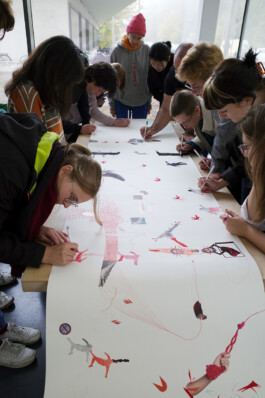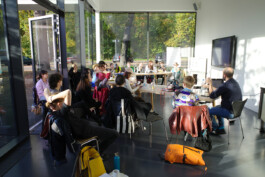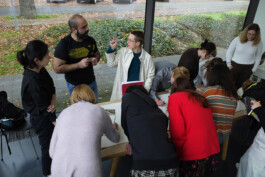


WORKSHOP in Klasse Kühn: DasArts Feedback Method with Manolis Tsipos (Athens)
October 17 - October 19, 2022, 9.30 h AQUARIUM AdBK Nürnberg
How can we discuss artistic work? What are the agreements between us we (need to) co-create whenever we meet and communicate with each other? Whom do we choose to offer us their thoughts and/or doubts about our work?
When it comes to offering and receiving feedback within our field, these questions, and many more, are urgent. One of the few attempts to address them has been the devising of the DasArts Feedback method. Philosophical practices, such as the Socratic Dialogue, are its starting point. This intensely discursive tool needs to be primarily seen as shared experience of a collective thinking process, as well as a vivid reflection on a specific artistic work, while it is still considered as a work-in-progress. In the context of the workshop at ADBK, let’s begin a conversation about the kind of feedback we appreciate, and about the kind of feedback we are urgently missing.
Manolis Tsipos was born in 1979 in Athens, Greece, where he lives and works. His artistic practice consists of four facets: he is a performance maker with a vivid interest on hybrid narratives and broadened concepts of what consists a choreography today; a few times published writer of prose and poetry in Greece, France and the USA; a mentor within multiple performing arts contexts (educational or solely artistic ones) in Europe; and a coach specialized in the DasArts Feedback Method. He holds two MA degrees (in “Theater”/DasArts in Amsterdam, 2012, and “Environmental Politics & Management“at the University of the Aegean, Greece, 2002). Furthermore, he is founding (and active until 2014) member of the Institute for Live Arts Research |Π|, and also founding (and active until 2011) member of the performance group Nova Melancholía, with both collectives based in Athens. In his work, he is fascinated by the force of language as inexhaustible shape shifter, endless vehicle of multiple meanings, and critical cornerstone of all imaginable communities inside and outside of our contemporaneity. His theoretical enquires are focused on how friendship could be conceived as a crucial factor in the understanding of our modes of artistic collaboration and cohabitation inside our field. Lastly, he is currently studying at the MA program of “Religious Studies” of the EKPA Kapodistrian University of Athens, in the specialization of Cognitive Psychology of Religion.
WORKSHOP in Klasse Kühn: DasArts Feedback Method with Manolis Tsipos (Athens)
October 17 - October 19, 2022, 9.30 h AQUARIUM AdBK Nürnberg
How can we discuss artistic work? What are the agreements between us we (need to) co-create whenever we meet and communicate with each other? Whom do we choose to offer us their thoughts and/or doubts about our work?
When it comes to offering and receiving feedback within our field, these questions, and many more, are urgent. One of the few attempts to address them has been the devising of the DasArts Feedback method. Philosophical practices, such as the Socratic Dialogue, are its starting point. This intensely discursive tool needs to be primarily seen as shared experience of a collective thinking process, as well as a vivid reflection on a specific artistic work, while it is still considered as a work-in-progress. In the context of the workshop at ADBK, let’s begin a conversation about the kind of feedback we appreciate, and about the kind of feedback we are urgently missing.
Manolis Tsipos was born in 1979 in Athens, Greece, where he lives and works. His artistic practice consists of four facets: he is a performance maker with a vivid interest on hybrid narratives and broadened concepts of what consists a choreography today; a few times published writer of prose and poetry in Greece, France and the USA; a mentor within multiple performing arts contexts (educational or solely artistic ones) in Europe; and a coach specialized in the DasArts Feedback Method. He holds two MA degrees (in “Theater”/DasArts in Amsterdam, 2012, and “Environmental Politics & Management“at the University of the Aegean, Greece, 2002). Furthermore, he is founding (and active until 2014) member of the Institute for Live Arts Research |Π|, and also founding (and active until 2011) member of the performance group Nova Melancholía, with both collectives based in Athens. In his work, he is fascinated by the force of language as inexhaustible shape shifter, endless vehicle of multiple meanings, and critical cornerstone of all imaginable communities inside and outside of our contemporaneity. His theoretical enquires are focused on how friendship could be conceived as a crucial factor in the understanding of our modes of artistic collaboration and cohabitation inside our field. Lastly, he is currently studying at the MA program of “Religious Studies” of the EKPA Kapodistrian University of Athens, in the specialization of Cognitive Psychology of Religion.